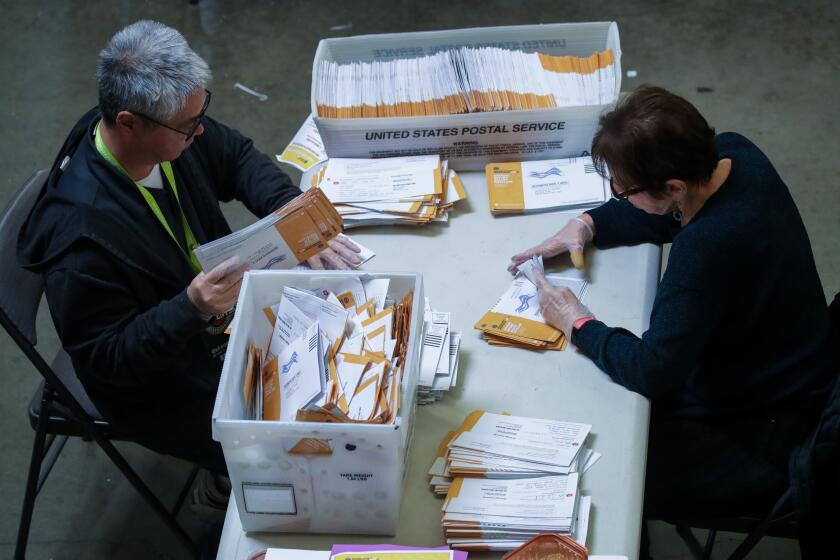Letters to the editor
Down the wrong road?
Re “Indian firm unveils the world’s cheapest car,” March 24
The reality is upon us: The bulk of the world’s population -- in India and, most likely, soon in China -- will have access to personal motorized transportation. Tata Motors’ Nano will reportedly sell for as low as $2,200.
This car is not fueled by electricity or hydrogen; it is fueled by that dastardly hydrocarbon. The U.S. and the EU may well spend trillions on the development of “green” cars, but the numbers of those vehicles will pale in comparison with the number of gas guzzlers in India and China. People in those nations will likely be able to afford $2,200 for a car, but not a $20,000 hybrid. We may feel good about driving hybrids ourselves, but we will remain a drop in the bucket.
If we even hope to reduce carbon emissions from cars, should we not accept this reality and, instead of pouring money into the development of electric cars and hydrogen cars that most of the world’s population cannot afford, invest in the development of biofuels that might remove as much carbon from the air as they emit out the tailpipe?
Forrest Bonner
Huntington Beach
Studying homework
Re “When homework is busywork,” March 22
I’ve had children in the Capistrano Unified School District since 1993. My 20-year-old has a satisfying, well-paid job with full benefits -- not because of excessive homework but in spite of it. My 18-year-old works part time and attends college full time. She has more time for friends and family now than she did in middle school. My 12-year-old’s homework load averages three hours a night. I believe the stress caused by his immense homework load these last few years was a significant factor leading to my divorce.
We put so much pressure on our kids. We want them to succeed and get into the best schools. But what is success? Getting into USC no matter the emotional or social cost? With today’s financial crisis, we are all reevaluating our priorities. I hope we do the same for our children.
Sharon Schramer
Laguna Niguel
::
Your excellent article on reducing homework omitted one key dimension: Boys will be helped by this even more than girls.
We’ve seen data showing that boys are increasingly underrepresented in colleges, professional schools and even in traditionally male occupations. Why? It all begins with too much homework in elementary school.
When we assign a lot of homework in early grades, girls tend to take to it more readily, while many of the boys are merely broken. For them, school is no longer fun. We can’t fix in high school this damage done much earlier.
We should dramatically reduce homework in the early grades and do whatever it takes to restore the fun of school and the enjoyment of learning.
Boys, in particular, should look forward to going to school. One way to accommodate their “special needs” is to allow for more recess and physical activity during the day and less homework at night until they develop more fully -- probably around middle school.
Jef Kurfess
Westlake Village
::
An education professor asks if, after solving 10 math problems a student grasps a concept, why assign 50? The answer: So the student doesn’t have to rethink the concept every time the method is used.
I just finished teaching integral calculus in a converted movie theater to 500 mostly first-year college students. To learn such a hard subject in this environment, a student needs to follow and perform routine computations easily. This comes with practice, sometimes called busywork.
A successful student must also nail down the more complex material through independent reading -- and study hard, even on weekends. Students who understand the value of learning outside the classroom, a.k.a. homework, are far more likely to succeed in such a course than those who have been encouraged to believe that their free time is only for non-academic activities.
Martin Scharlemann
Santa Barbara
The writer is a mathematics professor at UC Santa Barbara.
Taking steps to save your feet
Re “Doctors target diabetic foot loss,” March 22
I work exclusively with diabetic feet. It is alarming that we are seeing younger and younger people with foot ulcers and life-threatening medical issues.
About $3 million for podiatry was recently cut from California’s Medi-Cal budget. We podiatrists cannot provide services if we are cut out. Additionally, we must start to bring the governor’s challenge to exercise and eat healthy to all our schools.
Diane Branks
Pomona
The writer is a vascular podiatrist at Kaiser Permanente in Baldwin Park.
::
I believe that better education of the signs and symptoms of peripheral arterial disease would be an excellent way to stop the increase in these amputations.
Patients who have non-healing wounds on their lower extremities for more than three to four days, or who get pain in their calf muscles while walking, are having signs and symptoms of PAD. It is those patients who can benefit most from having an angiogram, using either convention contrast media or carbon dioxide, to see if they can have their legs’ circulation improved by angioplasty, which is cheaper and less invasive than in-hospital bypass surgery. As in all of medicine, prevention is better than the cure.
Jack E. Rubin MD
Inglewood
The writer is medical director of the Los Angeles Vascular Access Center.
A death debate
Re “Sense and suicide,” editorial, March 23
Because we have a natural right to die -- a right that is hamstrung by current laws -- I am puzzled by your editorial’s hostility toward the Final Exit Network, an organization formed in response to a growing need. It lacks the resources to come to the aid of everyone who asks for it, let alone to pressure patients to kill themselves.
And to say “it’s really just in the death business” is a willfully perverse description of the organization’s function. More accurately, it is in the relief-of-suffering business. Why insist that we linger in suffering at the end -- a burden to ourselves and family for days, months or even years?
Rather than continue pointing out the absurdity of your attack, I will simply say that I hope the Final Exit Network is still around when and if I ever need it.
C.J. Wright
Venice
Zillow in perspective
Re “Curse you, Zillow!,” Opinion, March 21
As a certified real estate appraiser, I take issue with Meghan Daum’s apparent panic over “Zillow values” for several reasons.
First, it’s no secret that Zillow uses averages and statistics to produce its home values, with little or no human reasoning whatsoever. This is unrealistic -- not only when values are low but when they are high. With no human, preferably an appraiser, to interpret what these averages mean for the value of each individual home, the chance of error is substantial.
Second, the only time anyone should care what a home is worth is when they sell or refinance. Value is hypothetical and speculative, and shouldn’t produce negative feelings, especially toward a home you once loved when it was “worth more.” Ignoring what is happening around you, in high or low markets, can protect your emotional economic health. It can keep you from pulling too much money out when values are high or walking away when values are low.
Americans seem to have amnesia when it comes to high and low real estate markets. The only certainty is that when there is an extreme high or low in values, it will be followed with an opposite extreme. So, get ready, Meghan. The market will rebound soon.
Elisabeth
Bernhart-Chatfelter
Lake Hughes
On the Eastside
Re “A new direction for West Hollywood,” March 21
Although I appreciate The Times’ coverage of West Hollywood, this story failed to include Eastside residents who are enthusiastic about these changes. Many of us have long sought economic development on this side of town.
I wish your story had depicted Casden Properties’ plans for the Movietown shopping center more thoroughly. Yes, it includes 294 condominiums, but the plans also call for new retail space and affordable housing. Casden has diligently listened to what we in the community have had to say about its project and conscientiously revised its plans to reflect our concerns. In these tough economic times, investment like this in our community is greatly appreciated.
Steve Levin
West Hollywood
More to Read
A cure for the common opinion
Get thought-provoking perspectives with our weekly newsletter.
You may occasionally receive promotional content from the Los Angeles Times.






